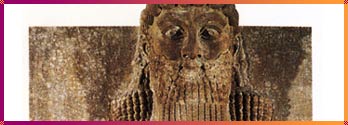 |
|||||||||||||||||||||||||||||||||||||||||||
|
The Near East
The people of Uruk were irritated by the wild behavior of Gilgamesh, their powerful king who was one-third mortal, two-thirds divine. The gods answered the people's prayers and sent down Enkidu, a brawny, shaggy-haired champion to rein in Gilgamesh. The wild man and the willful king met. They wrestled together, locked in furious embrace. Gilgamesh barely bested his opponent. Enkidu bowed before a strength greater than his own. The two became inseparable friends and fellow adventurers. They traveled to a great cedar forest for a tree-cutting contest. But first they had to slay the fire-breathing giant of the forest, Humbab. So fearful was this demon giant, that even Gilgamesh quaked before him. But Humbab had neglected to don his usual seven coats of armor. He was vulnerable — and soon headless. Gilgamesh's bravery caught the attention of the goddess Ishtar. She was smitten by the handsome king. He ignored her and ignited her wrath. Ishtar sent down the savage bull of heaven. Every time the bull snorted, its breath carved deep ravines through the earth. The monster ravaged Gilgamesh's kingdom. The heroes went after it. Enkidu seized the bull's tail and Gilgamesh slew it. Enkidu tore off one of the bull's legs and threw it at Ishtar. The goddess demanded he be punished. Enkidu then bore the gods' wrath and died, too. Civilization started here — and with it came influential gods, goddesses, heroes, demons, and mythical beasts. The ancient Near East produced deities later found in Greco-Roman mythology. Epic myths, such as the story of Gilgamesh, were read at ritual festivals to celebrate the triumph of good over evil. The struggle between the two was an important part of Near Eastern myth. |
||||||||||||||||||||||||||||||||||||||||||

